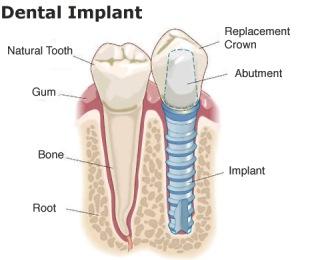It is extremely predictable with success rates in excess of 95% and is now seen as the ideal solution and first choice for replacing missing teeth.
The dental implants are placed in the gum where the natural tooth root would have been, providing a foundation for replacement teeth that look, feel, and function like natural teeth.
 Dental implants
Dental implantsDental implants are artificial tooth roots, made from titanium, used to support single or several false teeth known as restorations. These implants are placed painlessly into the jawbone to act as a replacement root for a missing tooth or teeth. Following a short healing period, during which the implant integrates with the bone, the restoration (tooth/teeth) will be fitted onto the abutment attached to the implant.
Implant therapy offers many treatment options which are effective both on their own, or incorporated as part of an extensive treatment plan.
Below are illustrations of some of the various solutions available, from a single missing tooth to a complete restoration.
a) Single tooth replacement b) Multiple tooth replacement c) Implant retained dentures d) All on 4 treatment
There are three stages involved with implant treatment:
All treatment is carried out here at Ready Steady Smiles Dental Practice in Donegal.
Treatment planning is as important as the treatment itself. During this stage, diagnostic photography and radiography will be used to determine the suitability of implant treatment. A 3D CT scan will also be required in order to assess the anatomical considerations and to evaluate the levels and quality of bone. This scan will be taken using the advanced scanning facility here at the practice.
The scan is studied in conjunction with our NobelClinician software to virtually plan your surgery.
Impressions may also be taken in some cases in order to make up a diagnostic wax up which will help illustrate the achievable end result.
Under a local anaesthetic, the Implant(s) are painlessly and gently placed through the gum into the bone. Often a small stitch or two will be placed however these will dissolve within 2 weeks. Antibiotics will be supplied postoperatively to encourage healing and to help keep the mouth clean and healthy. An interim denture may be provided to conceal the space while the implant integrates with the bone. (This usually takes between 3 and 6 months).
Restoration can begin following the healing period when the dental implants are deemed permanent.
Impressions will be taken and sent to the laboratory where the restorations (teeth) will be custom made to your requirements. Three weeks later the new teeth are fitted onto the abutment attached to the implant.
Dental Implants can also be used to good effect to secure and stabilise removable dentures.
Unlike traditional dentures, implant-supported ‘overdentures’ are secured in place by two dental implants to provide maximum retention and increased function. The overdenture ‘’snaps’’ onto the implants to keep it secure eliminating the need for adhesives. It is still removable for cleaning, similar to traditional dentures.